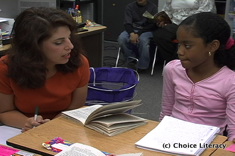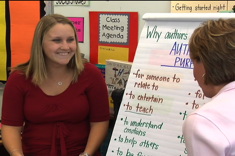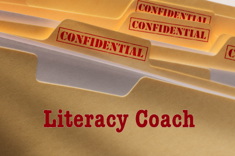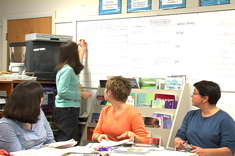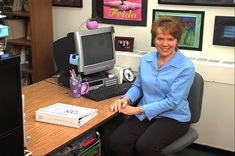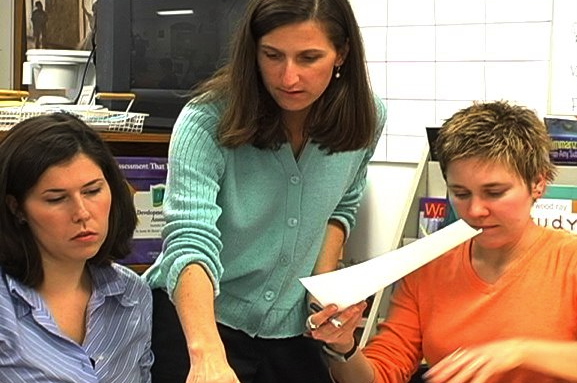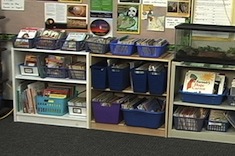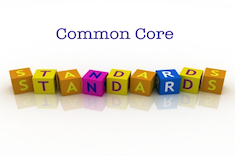Literacy Coaches
A simple question - who will coach the coaches? If you're a literacy coach, you already know there is no job more amazing or overwhelming in a school. Our Choice Literacy library includes a small sample of our resources for literacy coaches. If you work as a coach, you'll want a subscription that includes access to our Leaders Lounge, where there are over 900 resources for coaches, including study group protocols, videos of demonstration lessons, and guides for designing coaching cycles.
Latest Content
What’s Valued? Exploring Different Values in Evaluation (E-GUIDE)
Brenda Power shares a workshop series designed to help educators bring their values into closer alignment for a more cohesive experience for students.
The Dark Side of Girl Talk: How Female Conversation Patterns Can Inhibit School Change
Brenda Power explores the differences between “rapport talk” and “report talk” and what to do when communication breaks down with female colleagues.
Launching Teacher Study Groups: Guidelines and Resources
Jennifer Allen’s years of experience with teacher study groups has led her to best practices that make it “safe and easy” for teachers to learn from each other.
Getting Started with Your Own Writer’s Notebook
Notebook Faker Extraordinaire Aimee Bucker writes about how she managed after years of false starts to build the writer's notebook habit one summer not long ago.
Collaborative Teaching: Finding Common Ground First
These are important questions for teachers entering into a co-teaching situation to consider in advance.
Under, Over and Beyond Words: Strategies for Observing Talk in Classrooms
This article offers possibilities for observing classrooms focused on talk as an alternative to traditional observation notes.
Opinion Exchange: A Workshop Activity for Study Groups
New teachers need so much their first year and having the ability to be heard and have their opinions valued is right up there. Ruth Shagoury offers a respectful exchange to meet that need.
Literacy Coach Confidential: What Can I Do About Poor Attendance at My Study Group?
When attendance drops in study groups, here are some ways to get it back on track (or take a new direction entirely).
Keeping It Simple: Reflections on the December New Teachers Study Group
What is really important for our time and energy? Jennifer Allen reflects on words of wisdom that keep her centered as a literacy coach.
Literacy Coach Confidential: Teachers Resent Me – What Can I Do?
We address the issue of resentment by considering how leaders can stay optimistic and use questions to open up a discussion.
The Literacy Coach Work Area: Arranging Materials in Cramped Spaces
In this four-minute video, Literacy Coach Gail Boushey talks about how she arranges her materials in a limited space, and the benefits of sharing work space with colleagues.
Professional Development Needs Assessment Inventory
Teachers help define a literacy coach's role through a needs assessment survey.
Planning a New Teachers’ Professional Development Program
Jennifer Allen maximizes resources as she plans for a monthly professional development group for new teachers.
Idealism Fades to Reality: Thinking Back to My Days as a New Teacher
Jennifer Allen makes connections between her new professional life as a literacy coach and her beginning as a classroom teacher.
Layered Support: Meeting the Needs of Beginning Teachers
Jennifer Allen reflects on essential layers that provide a safety net for the challenges facing beginning teachers.
Coaching Moment: Reorganizing a Classroom Library
Gayle Gentry reflects on how a colleague’s simple request to reorganize a classroom library turned into coaching opportunities that had a direct impact on student learning.
Listen In: Jeffry’s Ocean Story
Moving a child from simple to complex sentences is the goal in this second-grade writing conference.
Common Core Conversations: Increasing Argumentative Writing
Teachers continue to puzzle over and sort through the terminology in the Common Core related to opinion and persuasive writing. Amanda Adrian and Heather Rader consider terms and teaching strategies.
Building a Professional Library from Scratch (SHORTS)
There are so many new professional books available for literacy leaders to purchase…and so little funding to buy them. Shari Frost gives the details of how one coach surveyed colleagues, assessed needs, and rooted out bargains before spending the precious $500 allocated for stocking the professional book library.
I Think, I Wonder, I Understand: Making Sense of the Work of Literacy Coaches
Jan Miller Burkins works with colleagues to develop the “I Think I Wonder I Understand” reflective tool for literacy coaches.
Browse Content By
Type
Category
- Assessment Tools
- Big Fresh Archives
- Booklists
- Choice Numeracy
- Classroom Design
- Common Core
- Community Building
- Conferring
- Content Literacy
- Digital Literacy
- English Language Learners
- Equity
- Family Relations
- Free Samples
- Guiding Groups
- Leadership
- Literacy Coaches
- Mentor Texts
- Minilessons
- New Teacher Mentors
- Podcasts
- Poetry
- Quote Collections
- Reading Strategies
- Self Care
- Struggling and Striving Learners
- Talking and Listening
- Teacher Study Groups
- Teaching Reading
- Teaching Writing
- Word Study and Vocabulary
Author
- Melissa Quimby
- Nawal Qarooni
- Gwen Blumberg
- Julie Cox
- The Lead Learners
- Hannah Tills
- Josie Stewart
- Ruth Metcalfe
- Mallory Messenger
- Becca Burk
- Jodie Bailey
- Vivian Chen
- Mary Brower
- Tiffany Abbott Fuller
- Stephanie Affinito
- Ruth Ayres
- Leigh Anne Eck
- Heather Fisher
- Shari Frost
- Julie Johnson
- Suzy Kaback
- Gigi McAllister
- Shirl McPhillips
- Melanie Meehan
- Cathy Mere
- Debbie Miller
- Tara Barnett and Kate Mills
- Tammy Mulligan
- Dana Murphy
- Bitsy Parks
- David Pittman
- Brenda Power
- Heather Rader
- Matt Renwick
- Mandy Robek
- Christy Rush-Levine
- Gretchen Schroeder
- Jen Schwanke
- Brian Sepe
- Katherine Sokolowski
- Stella Villalba
- Jennifer Vincent
Grade Level
Choice Literacy Membership
Articles
Get full access to all Choice Literacy article content
Videos
Get full access to all Choice Literacy video content
Courses
Access Choice Literacy course curriculum and training




